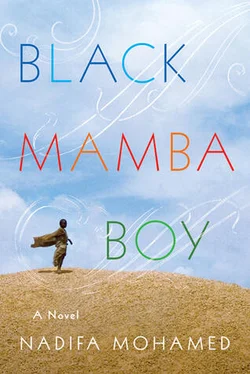Haganah activists circulated secretly among the passengers, and when a careless marine told one of them, “We’re sending you bastards back to where you came from,” the news spread within minutes and created a kind of millennial hysteria. “Palestine! Palestine!” was the chant. The refugees had borne the filth, heat, worm-infested soups, moldy crackers, and varied deprivations quietly for three weeks but now they exploded with angry yelling faces, painted gentian violet to heal the blisters and rashes that had erupted on board. By the time the ship docked at Port-de-Bouc in France, a swastika had been painted over the flying Union Jack and the marines had had to force the seething purple masses back into the cage after their riot.
The refugees had gathered from all over Europe, some by foot, to secure a precious place on the Exodus , but now they were captives again. The Haganah men were losing control, they thought they were assisting helpless refugees, but they were dealing with men and women who had withstood every kind of possible torment. Each day there were bomb scares and the marines treated all of the refugees as potential terrorists. The British refused to give the refugees water and rations, in the hope of forcing them to disembark, and in response a hunger strike was defiantly declared. The British pleaded and threatened, the French tried to mediate, but the refugees were adamant they would disembark only in Palestine. One woman had given birth in the cage and Jama could still see her lying in her blood and gore, her baby wrapped in a dirty rag torn from her skirt. He did not understand why they would not get off the filthy, hostile ship. If he had not bent with circumstances he would have been broken by them, but these people seemed to want to be broken or at least did not care.
The hunger strike fizzled out with the arrival of manna on launches operated by Haganah agents and paid for by American Jews; each day arrived crates of Irish stewed steak, French sardines, American evaporated milk, Spanish jam, French baguettes. The marines bayoneted the cans, to prevent smuggling, they said, but mainly out of jealousy, as they were still eating army rations. Even the crew looked on in envy at the refugees’ food aid. Books were also delivered by the launches, Torahs, novels, dictionaries, but the British confiscated these, fearing the propaganda secreted within them. Food was the only succor the refugees had. Even the weather had turned against them: it was the hottest summer on record in the south of France and the holds became ovens, the steel walls scalding bare flesh, the air fetid and unbreathable. The British were called Nazis, Hitler commandos, the Runnymede Park a floating Auschwitz. On this floating Auschwitz, the sailors and soldiers fished, sunbathed, and swam in the Med in their free time, just as SS men had frolicked in the pine resort of Solahutte near Auschwitz.
After the heat came the deluge, a four-day storm that forced all fifteen hundred refugees into the holds. The sky was black, strong winds tossed the ship from east to west, rain poured through the grilles and the holds filled with inches of bilgewater mixed with vomit. The British Nazis waited for the storm to break the refugees’ spirit but still they refused to leave. While the refugees relived the Old Testament on the Runnymede Park , Jama and a few other Somalis went on shore leave. A bus took them to Marseille and Abdullahi showed them around, guiding them in a crocodile line as if they were schoolchildren. He explained everything: the banks, post offices, the pigs’ heads and intestines hanging in the butchers. To unbelieving laughter, Abdullahi told them that the French also ate frogs and horses. Some of the Frenchwomen wore shorts, and the Somalis giggled at their exposed thighs. The sailors crept gingerly forward as if they had landed on another planet, everything strange and outlandish, and Jama recorded every detail to recount to Bethlehem. They went down touristy Rue de la Joliette and listened to the buskers along the Vieux Port, ate long crusty loaves on La Canebière, and ended up in the seedy Ditch, in an African bar run by a Senegalese man. An American named Banjo sat by them and played wild songs, “Jelly Roll,” “Shake That Thing,” “Let My People Go.” Jama danced Kunama-style to the strange music and the bar filled with black sailors from the West Indies, United States, South America, West Africa, and East Africa. Banjo introduced them to his friends Ray, Dengel, Goosey, Bugsy, and a pretty Abyssinian girl called Latnah, and Jama smiled as he shook their hands, wondering if Bethlehem would believe that there were Habashi girls in France. There was no need for translation between the dancers, they were spiritual siblings, all they needed to know was that they had washed up in this bar to spend the night together, the money that passed from the sailors to Banjo and his friends was irrelevant.
The twenty-eight days docked in Port-de-Bouc passed quickly, spent either in Marseille with Banjo and the other panhandlers, or on the ship sleeping and resting. Even on this gigantic vessel he felt crowded and trapped; the angry refugees and the armed marines were like two armies on the verge of war. Everything had become discordant and fraught. The British crew drank the days and nights away, arguments breaking out like summer storms, and when they were particularly violent, Jama would lock his cabin door and hide in bed afraid that they would take their anger out on him. The Somali firemen would force him to open the door and tell stories to distract him, of lands where the men dressed like women and women married trees, of sailors thrown overboard after petty arguments, of stowaways found too late. One of the sailors had earned the epithet Grave Reject, as he had survived three torpedoed ships during the war, appearing on the surface of the water as if by magic even though he was unable to swim. Another sailor had been to Australia and met an old Somali man living alone in a desert outpost; he had arrived in the last century as a camel trainer and now couldn’t remember a word of Somali. Australia, Panama, Brazil, Singapore, these were names Jama had never heard before, they might as well have been describing moons or planets, but these countries were now part of his world. Then they started to talk about women.
“The thing is, you can’t trust women, look at the kind of job we do! We’re gone too long, they end up thinking that we’ve forgotten them, so they forget us,” Abdullahi said.
“That’s not true,” cut in Jama.
“What do you know about it? The only thing you do in bed is piss yourself!” jeered Abdullahi.
“I’m a married man, with a wife ten times more beautiful than yours!” shouted Jama. He did not confess he had spent only one night with his bride.
“Oh yeah? Well, if she’s that beautiful and delicious, you have left your dinner out for another man to eat,” snorted Abdullahi. Jama turned his back to all of them and sulked.
For all their stories, the sailors had to admit that Jama had chanced upon a very remarkable ship for his maiden voyage. On the twenty-eighth day, distinguished men with medals covering their chests came on board and read out a declaration to the assembled refugees. Through the many interpretations of the Somalis who had a little English, Jama learned that the British were threatening the Jews, giving them a day to surrender or be taken to Germany. One Somali said that the Germans were the archenemies of Jews, and this was a very grave threat that the Jews could not ignore. To show their serious intent, the British handed out leaflets to the refugees and wrote the threat in many languages on a blackboard, and when the British finished talking, the Jews defiantly applauded and went back to the cage. That night launches filled with Haganah agents sidled up to the boat and with megaphones encouraged the refugees to stay on board. The British silenced them with a siren but it was too late. The next day, as the six o’clock deadline approached, only a solitary self-composed little girl, around twelve years old, left the ship. The rest stood to attention like legionnaires under their general, Mordechai Rosman, a partisan leader who had led a band of fighters out of the Warsaw Ghetto. With his long hair and bare bony chest, Rosman looked like an ancient prophet lost amid the modern world, where the Pharaoh had gas chambers, the Promised Land was subject to United Nations resolutions, and only desperate Somalis tried to wade across the Red Sea.
Читать дальше
Конец ознакомительного отрывка
Купить книгу












